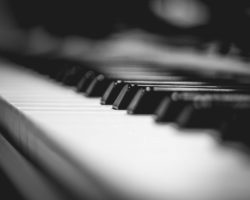
After the phone call, Elliott gathered his books and hefted his backpack over his shoulder. He walked across the seminary campus to the chapel, but he stopped before it and did not enter. Inside were the stained glass windows and the altar and the cross lifted high. He felt a sudden aversion to them.
He did not want to walk back across campus to his dorm. His body felt heavy; within, crackles of maddening energy coursed. He looked around as if viewing his surroundings for the first time. The Eiler Music Hall stood nearby. He would sit inside somewhere, out of the cold, and wait and struggle.
It was an old building, with old wooden floors. Along one hall, out of the way, were a row of small practice music rooms, each with a piano. He sat on the beach here, put his bag on the floor, and did not pray.
Elliott slumped against the wall and closed his eyes. He heard footsteps from the other end, a door opening. The door did not quite latch. He could hear some notes as fingers moved upon the keys.
Slow, familiar notes came unsteadily down the old hallway. Pachelbel’s Canon. Elliott was not well-versed in classical music, but even he knew the piece was worn out. Loved by millions of brides, yes. Hummable and catchy, yes. But in the end, it was just a round, just an embellished loop.
“All things are full of weariness,” he muttered, a sardonic smile lifting his lips. His morning Old Testament studies showed their usefulness.
The tune cycled in its lazy undulations, and Elliott thought on the meaningless and solidity of words sent through empty space, from one device to the next, and how a voice might never be heard again.
Slowly, he realized that the fingers in the room down the hall were dancing. The melody was twirling out of its set steps. It sprang up and laughed and settled back into its expected guise, wearing a sly grin. Then again it leapt up, spun, and pranced playfully back and forth. It was the same canon, but the fingers gave it freedom, improvising, setting it loose upon white keys and black, up and down and around, cavorting and tumbling, the stately beauty overflowing into joy, the expectant grandeur of the procession now a childhood dash, with a splash and a fall and a giddy scrambling. The wedding was coming, it was coming, and no one could wait, because if this were the prelude, if this rampant, barely contained energy sparking over the keys, as orderly as a child’s coloring page and as honest as an infant’s laugh–if this was the space before, what must the entrance of the bride, the climax of the great song become!
Elliott found himself weeping as the fingers somewhere found the old, worn melody. He thought of his mother, and of who she was and of the cross he had thought of with a sense of horrid emptiness after the call. He let himself cry, for he was sad and, he found, he was happy, too. The music could have continued forever, and he would not have noticed a minute pass. In a blink of an eye, a thing could be transformed.
He knew now what he had studied. He stood to return to the chapel to pray.